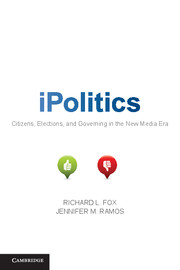Book contents
- Frontmatter
- Contents
- List of Tables and Figures
- Contributors
- Preface and Acknowledgments
- Introduction
- Section I The Shifting Media Universe and News Consumers
- Section II Campaigns and Elections in the New Media Environment
- 4 YouTube and TV Advertising Campaigns
- 5 The Rise of Web Campaigning in Finland
- 6 E-Campaigns in Old Europe
- Section III Civic Mobilization and Governance in the New Information Age
- Index
- References
6 - E-Campaigns in Old Europe
Observations from Germany, Austria, and Switzerland
from Section II - Campaigns and Elections in the New Media Environment
Published online by Cambridge University Press: 05 June 2012
- Frontmatter
- Contents
- List of Tables and Figures
- Contributors
- Preface and Acknowledgments
- Introduction
- Section I The Shifting Media Universe and News Consumers
- Section II Campaigns and Elections in the New Media Environment
- 4 YouTube and TV Advertising Campaigns
- 5 The Rise of Web Campaigning in Finland
- 6 E-Campaigns in Old Europe
- Section III Civic Mobilization and Governance in the New Information Age
- Index
- References
Summary
The Internet has changed the ways in which we create, access, and use information, knowledge, and entertainment. In turn, these tectonic shifts have led to the emergence of a new type of networked public sphere that has the potential to alter the dynamics of political communication in general and election campaigns in particular. When compared with traditional media, Web 2.0 and new media appear to be well-suited tools for use by political candidates to tap into a broad range of voters. Perhaps the most prominent example of these changes in the information environment is the Obama presidential campaign in the United States, in which the Internet played a significant role as a communication, mobilization, and fundraising tool. Examples from other parts of the world, where citizen journalism, participatory news media, and the blogosphere have had a remarkable influence on the outcome of elections, including in the Ukraine and South Korea, have gained much attention from scholars and the public at large. More recently, the so-called Twitter revolution in Iran and the role that social media played in the political turmoil in Egypt in early 2011 are complex cases of online mobilization, in which not only locals but also users from all over the world participated.
The consensus among European scholars is that U.S. campaign communication tactics generally influence those used in other global regions, including Europe. Considering these trends against the backdrop of a largely U.S.-centric body of (qualitative and quantitative) research aimed at investigating the Internet's impact on political communication and campaigning, this chapter explores the role of the Internet in recent campaigns in the German-speaking regions of Europe; in particular, it contrasts developments in these countries to those in the United States.
- Type
- Chapter
- Information
- iPoliticsCitizens, Elections, and Governing in the New Media Era, pp. 151 - 180Publisher: Cambridge University PressPrint publication year: 2011



